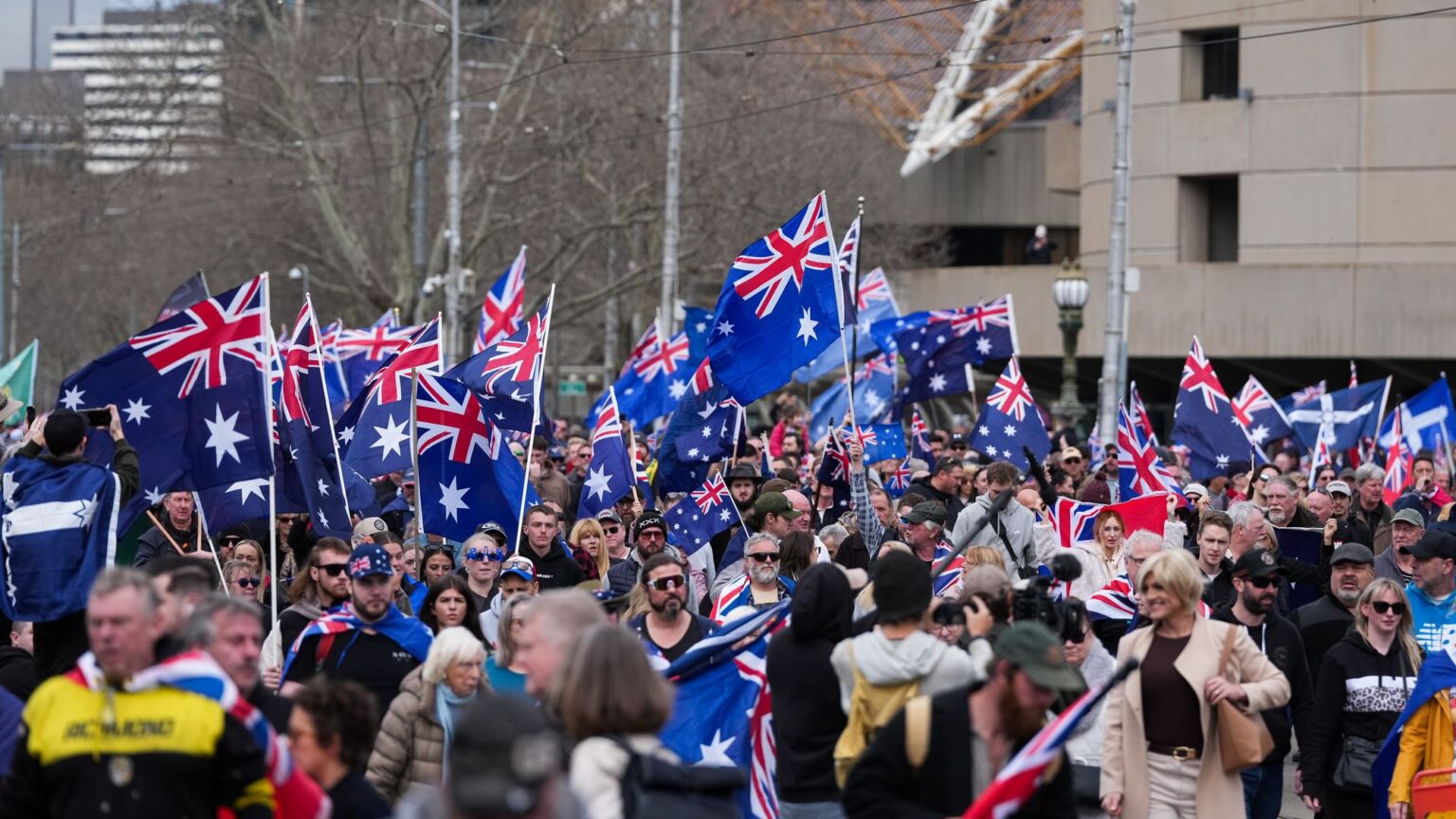Now Australia is erupting over mass immigration
The huge ‘March for Australia’ rallies were fuelled by far more than far-right agitation.

Want unlimited, ad-free access? Become a spiked supporter.
Australia’s most popular radio host, 2GB’s Ben Fordham, told his listeners last week that more than 1,544 migrants were arriving in the country every day. ‘That is the equivalent of five, fully-loaded Boeing 787 Dreamliners. Day after day, week after week’, he said dramatically. Fordham’s depiction may have been hyperbolic. But he expressed a widely felt grievance in Australia. Immigration has increased significantly recently, and no voter has been asked if they wanted this or not.
The discontent erupted last weekend when tens of thousands of people marched in protest against immigration in Australia’s capital cities. The biggest turnouts were recorded in Sydney and Melbourne.
The Labor government has struggled to articulate a clear response to the march. Most ministers have focussed on condemning the far-right elements present. And certainly, there were some genuine neo-Nazis at the rallies. Indeed, protesters in Melbourne were addressed by Thomas Sewell, the 32-year-old leader of the National Socialist Network, who spoke from behind a coffin draped in the Australian flag. Admittedly, many in the crowds will not have known who Sewell was, but it was still not a good look. Later, he was filmed leading an attack on a small group of Indigenous Australian counter-protesters.
What’s more, while the ‘March for Australia’ organisation is opaque, having no official spokespeople, there are some signs it may have a dodgy bent, too. A promotional flyer distributed in the run-up to the event complained that ‘more Indians [had migrated to Australia] in five years than Greeks and Italians in 100’.
The presence of such flyers and sinister characters like Sewell is indeed troubling. But in a country hardly known for holding mass protests, the scale of the marches suggests there must be something more afoot. Masses of Australians have not suddenly turned far right overnight.
What the March for Australia clearly speaks to is a broader, growing disquiet over mass immigration. This has far less to do with racism or xenophobia than with the sheer volume of arrivals in such a short space of time – which neither the people nor their elected representatives appear to have any control over.
Australia, like the UK and the US, has experienced record-high levels of immigration in recent years, especially after Covid. While this mass movement of people has been legal – illegal immigration was effectively stopped at the beginning of the 21st century by former prime minister John Howard – that does not mean it has been controlled, orderly or indeed popular. Net migration was close to one million between 2022 and 2024, an unprecedented figure for a country with a population of only 27million.
The reasons for Australians’ concerns about immigration are not hard to fathom. Like many other Western countries, Australia has relied on immigration to fill job shortages and prop up its gross domestic product. While this has allowed governments to make the specious case that the Australian economy has been ‘growing’, citizens have largely experienced stagnant wages and increasingly unaffordable homes. Indeed, over the past five years, average house prices have soared by nearly 40 per cent. It is this assault on the ‘Great Australian Dream’ – the assumption that any working Aussie could afford their own quarter-acre block a short drive from the beach – that has turned vast swathes of the country against immigration, more than anything else.
Does the government understand or care about these concerns? Prime minister Anthony Albanese responded to Sunday’s rally by accusing attendees of ‘sowing division’.
Unlike much of the Western world, Australia has long shown high levels of support for immigration – at least for the legal variety. But that support has started to wane. Voters increasingly feel they’ve been denied a say and that the government has lost control. Albanese’s future could well hinge on whether he is prepared to listen to them. Allowing high levels of immigration over people’s heads could be a recipe for electoral disaster.
Hugo Timms is an editorial assistant at spiked.
£1 a month for 3 months
You’ve hit your monthly free article limit.
Support spiked and get unlimited access.
Support spiked – £1 a month for 3 months
spiked is funded by readers like you. Only 0.1% of regular readers currently support us. If just 1% did, we could grow our team and step up the fight for free speech and democracy.
Become a spiked supporter and enjoy unlimited, ad-free access, bonus content and exclusive events – while helping to keep independent journalism alive.
———————————————————————————————————————————–
Exclusive January offer: join today for £1 a month for 3 months. Then £5 a month, cancel anytime.
———————————————————————————————————————————–
Monthly support makes the biggest difference. Thank you.









Comments
Want to join the conversation?
Only spiked supporters and patrons, who donate regularly to us, can comment on our articles.